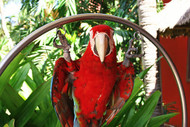Get Involved with World Wildlife Conservation Day
Posted by World Wildlife Conservation Day, Wildlife, on 8/4/2025
We all know how to care for our Parrots in our homes but how much do you know about conservation projects supporting Parrots in the wild?
Now is your perfect chance to learn more about how wild Parrots are looked after as Thursday 4th December is World Wildlife Conservation Day.
This is an annual event organised by the WWF , to raise awareness of the plight of endangered animals (not just Parrots) and encourage people to get involved in conservation efforts.
Over 50 species of Parrots are threatened in the wild, mainly due to their habitat being destroyed, however the WWF are running various projects to help Parrots in the wild.
Trade
Although the trade of many Parrot species is strictly controlled, illegal transactions are, sadly, commonplace. This, combined with acres of forests being cut down, have led to wild Parrot numbers decreasing.
Parrots traditionally live in forested areas, such as the Amazon rainforest, cloud forests in Colombia, eucalyptus forests in Australia and monsoon forests in Indonesia. Parrots rely on the forest to supply them with food and breeding grounds.
The Pantanal wetland in Brazil is home to hundreds of animal species and is incredibly biologically diverse. The Hyacinth Macaw lives in this area, although with only a few thousand of them left in the wild, its survival is under threat due to the destruction of trees and illegal Parrot trade.
The trees are being removed from the Pantanal because of a planned waterways project in the area.
WWF
However the WWF are working with the authorities to look at alternatives to the waterways project and encourage local people to use sustainable resources and therefore ensure the Pantanal?s ecosystem is preserved, and as a result the Hyacinth Macaw is too. The WWF have also persuaded the Brazilian government to triple the area of protected forests.
Over in Indonesia, vast areas of woodland are being destroyed by forest fires. Parrot species including some Cockatoos and Lorikeets live in the forested areas, but only have a limited number of places to go if their home is destroyed. The WWF is working with local industries to assess forest fire damage and make sure businesses are held accountable for causing fires in the first place.
Another Indonesian project is protecting the forest areas threatened by mining and forestry, to secure the survival of the 14 threatened Parrot species in that area, which include the Pesquet?s Parrot and Blackwinged Lory.
World Parrot Trust
Many of the conservation projects are run with the World Parrot Trust. Since they began in 1989, the World Parrot Trust has supported conservation projects in 20 countries for 37 species of Parrot.
The World Parrot Trust has seen some incredible results. They have ended the trade of wild Parrots in the EU, developed the Parrot Action Plan, which sets the recommendation for Parrot conservation in the next few years and delivered education programmes to communities living near wild Parrots.
All this has helped captive breeding, conservation of various Parrot species, rehabilitation and release of Parrots back into the wild and much more, which you can read about on their website.
The World Parrot Trust?s work continues, and current projects include running educational businesses in the Caribbean islands of St Vincent, St Lucia and the South American country of Paraguay, re-establishing wild populations of African Greys in African countries including Uganda, Tanzania and Angola, and much more, which again you can read about on their website.
Projects
But don?t worry, there are things you can do to help as well for World Wildlife Conservation Day. Adopt a wild Macaw or Cockatoo from the WWF, and the money raised from this goes towards funding Manu National Park in Peru, which is home to 10% of the world?s bird species.
If you are considering buying a Parrot, check all the paperwork first. Don?t buy a Parrot whilst on holiday abroad either, as more often than not they have been smuggled into the country illegally, thus reducing Parrot numbers.
Buying from a reputable breeder or shop means it?s more likely the Parrot is being sold responsibly.
Or why not buy a packet of Versele-Laga food for your Parrot? Versele-Lage work closely with Loro Parque, a zoological park in Tenerife that monitors Parrot species in their grounds, and gives assistance to other Parrot conservation projects around the world. Every bag of Versele-Laga food sold goes towards the Loro Parque Foundation.
There is so much going on throughout the year to support the conservation of Parrots, and not just on World Wildlife Conservation Day.
Get involved and discover how your money helps the conservation of Parrots.


